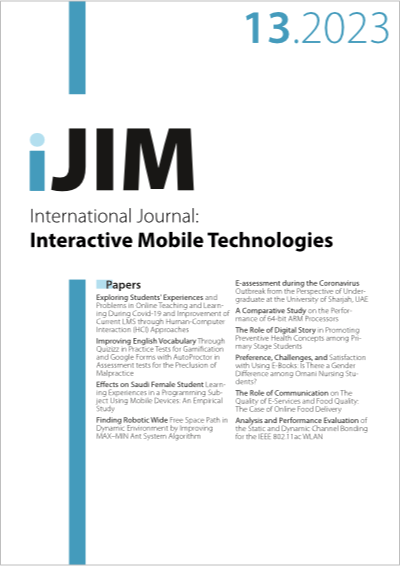Improving English Vocabulary Through Quizizz in Practice Tests for Gamification and Google Forms with AutoProctor in Assessment tests for the Preclusion of Malpractice
DOI:
https://doi.org/10.3991/ijim.v17i13.39445Keywords:
Vocabulary, Blended learning, Quizizz, Google forms, AutoProctor, Higher EducationAbstract
Research on Vocabulary is prominent, and it helps learners find many diverse ways to learn vocabulary to a greater extent. However, the research on vocabulary in recent years gradually diminishes as students age and get to higher education [1]. Many researchers recommend the effective use of digital tools to motivate students to participate actively in learning [9], and digital gamification makes quite an impact by creating student interest in word learning [1] [12]. At this juncture, our research serves the need for improving the vocabulary of Engineering students through digital gamification using 'Quizizz' in their Practice tests and Google Forms with 'AutoProctor' to preclude their malpractice during their assessment test-taking. This study was carried out based on quantitative research by collecting and analyzing numerical data of a couple of research groups, the control group (n1=45) and experimental group (n2=69), and also through a closed-ended questionnaire using a Likert Scale. The findings demonstrate how this research culminated in the results that brought a subtle difference in the two groups; the control and experimental groups that pursued the traditional and blended methods. The Pooled Standard Deviation (Spooled) (Weighted average of Standard Deviations from both the groups) statistically demonstrated that it had deviated from the control group's Standard Deviation (s1) by 0.286 and from the experimental group's Standard Deviation (s2) by 0.2. This weighted average vindicated the study that the experimental group could perform better than the control group in the post-test.
Downloads
Published
How to Cite
Issue
Section
License
Copyright (c) 2023 Venkata Ramana Manipatruni, Nannapaneni Siva Kumar, Mohammad Rezaul Karim, Sameena Banu

This work is licensed under a Creative Commons Attribution 4.0 International License.


